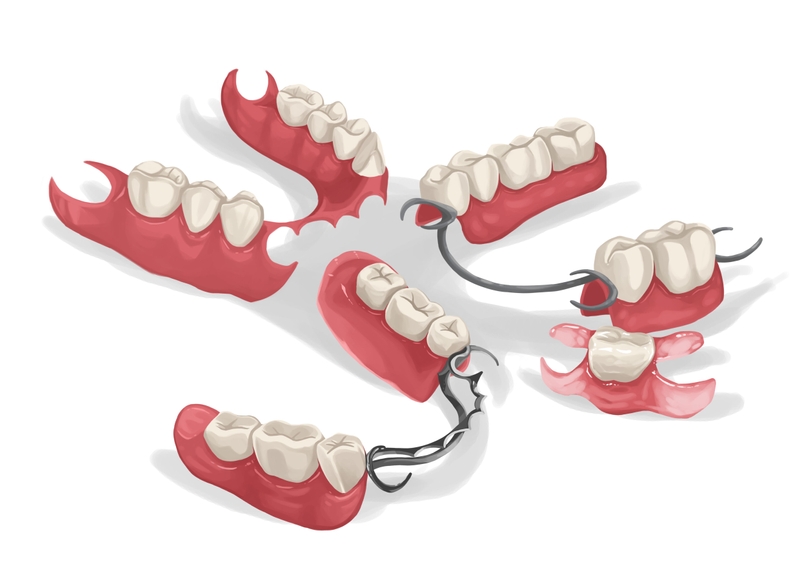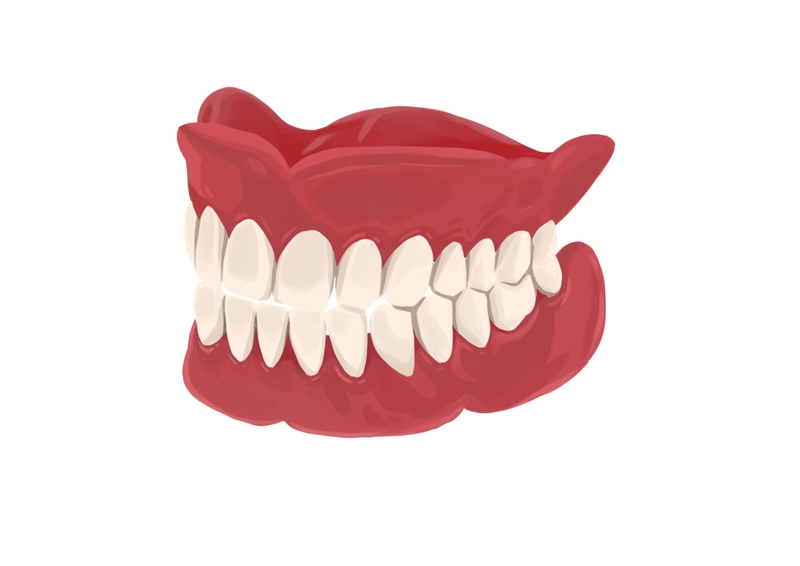- Dentures are removable appliances that can replace missing teeth or an entire arch of teeth.
- Partial dentures are recommended when the entire dentition hasn't been lost. Full dentures are suitable for completely edentulous patients.
- Types of dentures include acrylic, flexible dentures, metal dentures, and interim dentures. Depending on the time of delivery, there are immediate, same-day, and interim dentures, as well as conventional dentures.
Ready for a breathtaking smile? We're here for you. Use Authority Dental to book the best denture dentists near you. It's simple, fast and trustworthy.
Are you considering dentures as a tooth replacement option? Here's everything you need to know.
Types of dentures
The most common way to classify dentures is by whether they are full or partial. The two kinds have different delivery times and are recommended in different cases.
Partial denture

Picture by Authority Dental under CC 2.0 license
A partial denture can replace a number of teeth if not all of the dentition is lost. It is a removable plate that can contain one or more teeth, not necessarily next to each other.
A partial denture may replace only the front and/or back teeth, as needed. Precision attachments might be added for extra support and sturdiness.
There are several options to choose from depending on the condition of your mouth:
acrylic,
metal, or
interim.
Not everyone is a candidate for each type. You may also want to consider a dental bridge as an alternative if you are only missing a tooth or two. Bridges can replace up to two adjacent teeth.
Full dentures

Picture by Authority Dental under CC 2.0 license
If you are fully toothless, you will need a full denture. If you have some teeth remaining, it is up to your dentist to decide whether to create a partial or to extract the remaining dentition and fit a full prosthesis anyway. It all depends on how much stability your teeth give you.
Full dentures include 12 to 14 teeth per arch. Some end at the first molar, but a second molar is sometimes added for sturdiness. The determining factors are the space available and presence of opposing teeth.
The choice is between:
same-day,
interim,
overdentures, or
conventional dentures.
Immediate prostheses are fashioned before remaining teeth are removed. Same-day dentures are made in 24 hours, including necessary extractions. Interim ones may be worn while you are awaiting implant-retained or conventional dentures.
In conventional dentures, the upper arch covers the whole roof of the mouth and may be attached by suction. It may take a few weeks to produce one.
Implant-retained, or overdentures, provide the most support. In addition, they help reduce bone loss which means the state of the mouth won’t continue to deteriorate. You will, however, need surgery.
How are dentures made?
Most dentures take anywhere from 6 weeks up to 3 months to land in your mouth. The process includes several visits to the prosthodontist or dentist. This is to ensure the best fit and durability possible.
The process is more complicated if there are dental implants involved. The whole thing might take up to 2 years.
Initial consultation
It’s a good idea to ask about dentures during a periodic exam with your dentist. He or she will propose a treatment plan and schedule possible extractions. The type of denture will also be determined. This includes the materials and whether the prosthesis is to be full or partial.
Impressions
Taking impressions is a necessary step to determine the shape of the denture. It needs to mimic the surface of your jaws exactly. In the case of an immediate denture, this might take place before teeth are removed.
The dentist will place a soft putty in your mouth after cleaning it. This might be done twice if you need a denture for both the top and bottom arches.
Lab technicians use such models to make a dental cast and then the denture. This stage can take a few weeks.
Adjustments
Patients often come in several times at this stage to make adjustments. It rarely happens that a prosthesis will fit perfectly straight away. It might be thickened in some spaces if the denture is loose.
Getting your denture
When you finally get your denture, the dentist will instruct you on how to best take care of it. Make sure to follow their tips and advice exactly for best results.
Follow-up appointments are common, as are dental lab repairs every year or so. It’s important to visit your dentist regularly to make sure your denture fits properly. If it doesn’t, it could cause irritation and lesions which can lead to denture stomatitis.
Pros and cons of dentures
Can make eating and speaking easier
Cost-effective compared to alternatives
Custom-made to fit your mouth
Often feel awkward for a few weeks
Must be kept in water when not in the mouth
Separate denture and mouth maintenance
Saliva flow temporarily increases
Fit must be regularly checked and adjusted
Relines are needed every year or so
Denture adhesive is often necessary
Patients should avoid hard, sticky, and chewy foods
Have to be taken out when you go to bed
You may have to go without teeth for a while
Replacements are needed after a few years
Dentures facts and statistics
Over 36 million Americans are toothless.
90% of toothless Americans have dentures.
Each year roughly 15% of those who are toothless get dentures.
80% of full denture wearers avoid eating vegetables.
The first dentures were made in the 7th century BC.
In the early 16th century dentures were made from wood and beeswax. The first porcelain dentures were made near the end of the 18th century.
FAQ
What dental specialists can make dentures?
If you want to go to a specialist, you can reach out to a prosthodontist. A large majority of dentures, however, are made by general dentists.
How long should you wear dentures each day?
Wear your denture for at least a few hours every day. You have it for a reason. A break of no more than 6-8 hours per night is recommended. Make sure to store it properly during that time.
References
- Denture Adhesives in Prosthodontics: An Overview
- Gagging: A problem to prosthetic dentistry - Review
- Flexible Thermoplastic Denture Base Materials for Aesthetical Removable Partial Denture Framework
- Facts About Adult Oral Health
- Interim dentures and treatment dentures
- The Impact of Edentulism on Oral and General Health
- Dentures
- Comparing the effects of titanium alloy and chrome cobalt in removable partial denture connectors on tooth mobility, bone loss and tissue reaction
- Flexible denture base material: A viable alternative to conventional acrylic denture base material
- Polyamide as a Denture Base Material: A Literature Review
- Achieving a good bond in acrylic resin denture teeth
- Porcelain Tooth
- Functional Impressions in Complete Denture and Overdenture Treatment
- Relining complete dentures with the use of a functional impression
- Denture Stomatitis
- Ill-fitting dentures and oral cancer: a meta-analysis
- Taste buds: cells, signals and synapses
- Diagnosing denture pain: Principles and practice
- Edentulous patients’ knowledge of dental hygiene and care of prostheses
- Denture Care and Maintenance
- Prosthodontics: Facts & Figures
- Digital Dentures: Achieving Precision and Aesthetics
- Impact of Denture Usage Patterns on Dietary Quality and Food Avoidance among Older Adults
- The Use of Gold in Dentistry
- The dawn of modern dentistry in Japan: The transfer of knowledge and skills from foreign dentists to Japanese counterparts in the Yokohama Foreign Settlement
Namrita Harchandani, DMD
Traditional partial dentures are much cheaper than permanent options. However, they may get loose over time and sometimes have a metal clasp that may show through when you smile.